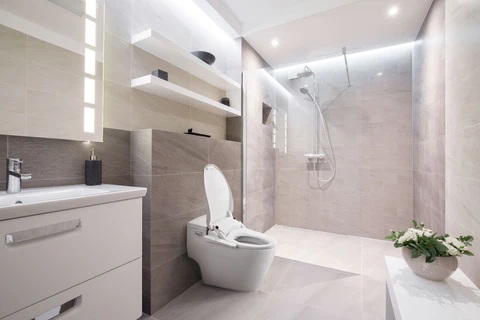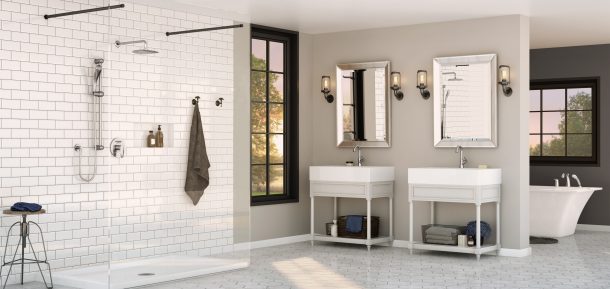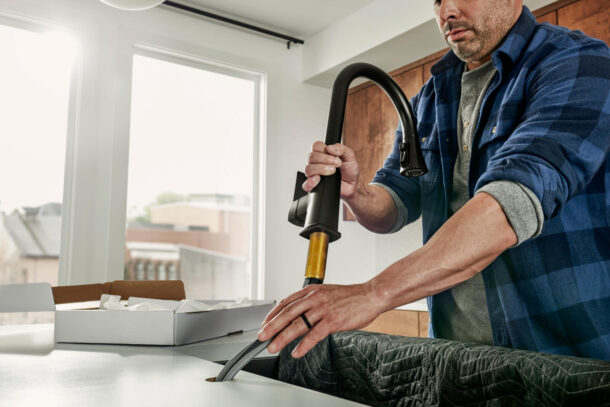1. Decide How Much You Can Spend2. Focus on the Features That Matter3. Choose Materials That Clean Up Easily4. Improve the Lighting for a Better Look5. Add Useful Storage Where You Can6. Choose Fixtures That Are Built to Last7. Add Personal Touches That Feel Thoughtful When guests stay overnight, your bathroom is one of the Read more
Whats New
Table of Contents
When guests stay overnight, your bathroom is one of the spaces they use most. Yet many homeowners in Tulsa tend to overlook it when updating their homes. It’s easy to focus on kitchens, living rooms, and bedrooms—but the guest bathroom matters just as much. A well-designed bathroom can make guests feel more welcome and at ease. It also adds to your home’s overall value.
If your guest bathroom hasn’t been updated in years, it might be time to make a change. Even small upgrades can improve the space and enhance the experience for visitors. From updated fixtures to better lighting, a clear and thoughtful plan can make a real difference.
Use this checklist to guide your guest bathroom makeover. Each step is practical, easy to follow, and focused on helping you get useful, lasting results.

1. Decide How Much You Can Spend
Once you know what needs work, figure out how much you want to spend. Your budget doesn’t have to be large to make an impact. Even small changes can improve the space. Focus on the most important updates and be honest about what you can afford.
Break your budget into simple categories like fixtures, flooring, lighting, paint, and labor. Always leave a little extra in case of surprise costs. It’s common to run into hidden plumbing issues or outdated wiring, even in a small bathroom.
If you’re unsure where to begin, it’s a good idea to consult a bathroom remodeling company in Tulsa. They can walk you through estimated costs for your specific goals and help you see where to save and where to invest.
2. Focus on the Features That Matter
Not everything needs to be replaced. Focus on the parts of the bathroom your guests will use most. That includes the sink, toilet, and mirror. If these are outdated, worn, or hard to use, replace them first. New towel bars or shelves are helpful too if storage is limited.
Think about the little things that add function. Does the toilet flush well? Is there enough space to set down a toothbrush or small bag? These simple features improve usability and comfort more than trendy décor ever will.
3. Choose Materials That Clean Up Easily
No one wants to scrub a bathroom every day. When picking materials, choose surfaces that are simple to wipe down and hold up over time. Glossy tiles may look good, but they show smudges and water spots. A matte finish hides fingerprints better. Quartz is a strong, low-maintenance choice for countertops.
Paint matters too. Use semi-gloss or satin finish paint on the walls—it resists moisture and is easier to clean than flat finishes. Keep these details in mind as you shop, and your guest bathroom will stay fresh-looking with less effort.

4. Improve the Lighting for a Better Look
Lighting plays a big role in how a bathroom feels. A dark or shadowy space makes the room seem smaller. It can also be hard for guests to use the mirror if the lighting isn’t bright enough. A well-lit bathroom looks cleaner and more welcoming.
Use layered lighting if you can. Add a light above or around the mirror for tasks like washing up or putting on makeup. Choose bulbs that give off a soft white light—it’s easier on the eyes than bright white or yellow tones. If your budget allows, consider adding a ceiling fixture or wall sconce for extra brightness. Good lighting doesn’t just help your guests—it also makes the whole bathroom look more modern.
5. Add Useful Storage Where You Can
Storage is often limited in small bathrooms, especially guest ones. But your visitors still need a spot for their toothbrush, toiletries, or a few personal items. A cluttered counter or messy shelf can leave a bad impression. That’s why storage should be part of your plan.
Look for simple ways to add it. A cabinet under the sink, a narrow shelf above the toilet, or a small rack on the wall can go a long way. Even a basket with rolled-up towels shows that you’ve prepared for your guests’ needs. Keep it neat and minimal. The goal is to offer what’s needed without crowding the room.
6. Choose Fixtures That Are Built to Last
Bathroom fixtures may seem like small details, but they can make or break the room’s function. Wobbly faucets, loose towel bars, or old cabinet handles all need to go. When updating, pick fixtures that are sturdy, easy to use, and simple to clean.
Brushed nickel and matte black are great choices because they hold up well and don’t show fingerprints. Make sure the faucet has good water pressure. Choose a toilet that flushes efficiently. These choices make the space more reliable and improve the guest experience. It’s worth spending a bit more here for better quality.

7. Add Personal Touches That Feel Thoughtful
Once the main work is done, add small items that show care. These extras don’t need to cost much, but they leave a lasting impression. A clean hand towel, a pump bottle of soap, and a small mirror are easy wins. Add a candle, a small plant, or a basic first-aid kit if space allows.
You don’t need to overdo it. The idea is to make guests feel welcome without cluttering the room. These touches show that you’ve thought about their comfort, and that attention to detail matters more than expensive materials or bold designs.
A guest bathroom makeover doesn’t have to be overwhelming. With a clear plan and a focus on what matters most—function, comfort, and style—you can create a space that both looks great and works well. Guests will notice the effort, even in the smallest details. And if you ever need help along the way, don’t hesitate to reach out to local pros who can guide the project. In the end, a clean, updated, and thoughtful bathroom will make your home feel even more inviting.

Plumbers looking to branch out into the field of HVAC maintenance and installation need to learn specialized skills that go beyond piping and fixtures. From mastering refrigeration systems to understanding airflow dynamics, each competency will build your ability to handle heating, cooling, and ventilation challenges confidently. So, here are five essential skills that every plumber Read more
Plumbers looking to branch out into the field of HVAC maintenance and installation need to learn specialized skills that go beyond piping and fixtures.
From mastering refrigeration systems to understanding airflow dynamics, each competency will build your ability to handle heating, cooling, and ventilation challenges confidently.
So, here are five essential skills that every plumber needs for a successful HVAC career.

1. Refrigeration System Knowledge
Understanding refrigeration systems (which you can learn at specialist educational establishments like The Refrigeration School) is foundational for HVAC work.
This involves knowing how refrigerants cycle through compressors, evaporators, and condensers to create cooling effects.
You also need to grasp pressure-temperature relationships in these systems, as they’re crucial for diagnosing performance issues or leaks.
Recognizing the components of different system types – split units or packaged systems – can help you install or maintain them efficiently.
A clear knowledge base lets you troubleshoot problems accurately and ensures compliance with regulations like safe refrigerant handling standards.
2. Electrical Troubleshooting Skills
HVAC systems rely heavily on electrical components. Knowing how to test circuits, locate faulty wiring, and handle control boards is critical for maintenance or repair.
Being familiar with reading schematics and using tools like multimeters can save time when diagnosing issues in thermostats, relays, or compressors.
Also, safety is key here. So, understanding voltage ratings and proper handling is crucial for preventing accidents during troubleshooting.
A strong grasp of these skills not only resolves system problems efficiently but also builds confidence in working around complex electrical setups.
3. Thermodynamics Understanding
Knowing how heat transfers, airflow moves, and energy exchanges are critical for designing efficient systems. After all, HVAC systems revolve around the principles of thermodynamics.
Understanding concepts like heat gain or loss helps you size equipment accurately.
Comprehending phase changes in refrigerants ensures better diagnostics during cooling failures.
This knowledge connects directly to practical work – like optimizing heating efficiency or troubleshooting uneven cooling zones.
By mastering thermodynamics basics, you can provide solutions that improve comfort while minimizing energy waste in homes and businesses alike.
4. Airflow and Ventilation Basics
Proper airflow is the backbone of HVAC performance. Without balanced ventilation, systems struggle to maintain consistent temperatures or manage air quality.
Recognizing how ductwork layout affects circulation helps you identify pressure imbalances or blockages. You’ll also need to measure airflow rates with tools like anemometers to ensure they meet system specifications.
Understanding ventilation basics aids in improving efficiency, controlling humidity levels, and addressing issues like uneven heating or cooling.
Strong expertise in this area ensures systems run smoothly while maximizing occupant comfort.
5. HVAC Diagnostic Techniques
Lastly, troubleshooting HVAC issues requires sharp diagnostic skills.
Systems can fail for many reasons, from refrigerant leaks to faulty sensors or airflow blockages.
A systematic approach helps narrow down the cause.
Using tools like pressure gauges, leak detectors, and infrared thermometers speeds up problem identification.
Knowing how to interpret error codes on modern systems also saves time during repairs.
Strong diagnostics ensure you fix problems accurately the first time, preventing repeat visits and building trust with clients through reliable service.

If you are a plumber and you find work isn’t coming in as much as you might like, or perhaps you want to build your business up further, you’re not alone. It could be that you used to solely rely on word of mouth, which is great, but can sometimes only get you so far Read more
If you are a plumber and you find work isn’t coming in as much as you might like, or perhaps you want to build your business up further, you’re not alone. It could be that you used to solely rely on word of mouth, which is great, but can sometimes only get you so far and if you want to take your business to the next level, you need to bring in some other tactics in order to do so. In this article we take a look at some top tips on how you can market your plumbing business in order to increase its success.
Focus on the technical side of things
When it comes to marketing a business, you need to ensure you take care of the technical side of things. This means sorting out your website so people can find it – getting an SEO company like Toni Marino can really help with this – as well as making it user friendly and informative. You want people to come onto your site and be able to contact you and find out any necessary information about your services.
Ask your customers for testimonials
People buy from people. When it comes to getting new customers to trust you and understand you are a reputable plumber, you should show your past reviews. These should be showcased on your website, Google profile and social media, as well as in your marketing materials such as brochures or flyers if you have them. These can show how fantastic your work has been for others in the past and give an idea of what you can do for them. It will also show you are legitimate, trustworthy and can do the job at hand.

Engage with your community
Community is everything when it comes to running a business, so you want to nurture and build these connections. There are a myriad of ways you can do this, including encouraging your customers to leave reviews and tell others in the community about you. You could offer a referral reward off a future service to help with this too. You could attend local events where you can speak with others, as well as work with and collaborate with other local tradespeople such as electricians so you can provide a joint service and recommend each other. This can help to spread the word.
These are just a few things you can do that can help you to market your plumbing business. Whether you are looking to bring in new customers to expand your team, or just to bring in a bit of extra money in a month, they should help. Focus on improving the technical side of your company, such as your website and SEO, showcasing the positive reviews you have received, and engaging with your community. What are some top tips you have for marketing a plumbing business? Let us know in the comments below, we’d love to hear from you.

Running a plumbing business would be much simpler if you could handle only one bathroom at a time, but it does not always work that way. At times, you will need to manage the work for multiple bathrooms at the same time, often requiring travel to different locations. Multi-bathroom projects can be a way to Read more
Running a plumbing business would be much simpler if you could handle only one bathroom at a time, but it does not always work that way. At times, you will need to manage the work for multiple bathrooms at the same time, often requiring travel to different locations. Multi-bathroom projects can be a way to expand your clientele and revenue, but they require different approaches to management. By considering these tips, you can streamline your workflow and manage the problems that come up when handling multi-bathroom projects.

Anticipate Risks
Every project has risks that can delay work or even cause the project to fail. Anticipating these risks in advance gives you an opportunity to evaluate which ones need additional planning to avoid. Problems come from a variety of places and may include:
- Trouble getting materials
- Changes in price due to rapid inflation of a particular component
- Difficulty securing services of a subcontractor
- Inclement weather that prevents work
- Equipment downtime for maintenance or repair
For each risk, do some research and estimate whether you need to plan ahead. When in doubt, try to order materials and secure labor services as early as possible, and build in extra time to complete the project.
Create Efficient Schedules
Creating an efficient schedule for bathroom remodeling becomes more complicated when you have multi-bathroom projects. Consider itemizing the tasks for each bathroom so that you can break it down by the work and the type of service provided at any time. Create time estimates for the work needed at each location and be sure to build in time to get from one place to another. Avoid overbooking your staff and subcontractors, as it is more likely to result in late shows and annoyed customers. Instead, consider using a time management tool that allows you to highlight each worker’s responsibilities so you can minimize overbooking.
Manage Material Allocation
Ordering a larger amount of supplies for multiple projects can save you money and time, but it requires a robust inventory management system. If your warehouse is an impractical place to keep your supplies during the project, consider designating a single spot for each project site to hold inventory. Remember to bring a little more than you need to account for damage or manufacturer defect in the materials. Perform a count of each item at the beginning and end of every day, to confirm that you have the right number of materials and components.
Monitor Each Project
Ideally, one person on your staff can monitor the status of projects as they progress. When you are knee-deep in a single task, it can be easy to forget responsibilities and other work you need to do for other stages. Assign someone who can maintain oversight of the entire project, possibly coordinating efforts between plumbers, subcontractors and customers. Use a system that allows you to update the status of the project at various benchmarks so customers can see how the project is going at a glance. Remember to look at the status regularly so you can make adjustments to timelines and schedules as needed.
Maintain Communication With Stakeholders
Proper communication is the key to making all the effort come together into a sleek project that pleases the customer. Without it, you run the risk of letting misunderstandings turn into problems or failures. Set aside time at regular intervals to communicate with staff, other plumbers, subcontractors and clients. Find out which communication methods are most effective and use them consistently. Leave enough time in your schedule to make phone calls or send texts and emails so you do not forget to provide an update.
Managing projects for multiple bathrooms can yield several benefits for plumbers, but they have unique needs. By following this advice, you can increase the quality and success of your next multi-bathroom project.

There’s something undeniably satisfying about getting a great deal – it might be snagging a discount on a new gadget or finding a cheaper alternative to an expensive service, or loads of other possibilities, but the point is that saving money always feels like a win. But when it comes to plumbing supplies, cutting corners Read more
There’s something undeniably satisfying about getting a great deal – it might be snagging a discount on a new gadget or finding a cheaper alternative to an expensive service, or loads of other possibilities, but the point is that saving money always feels like a win. But when it comes to plumbing supplies, cutting corners can absolutely end up costing you more in the long run – and that’s not a win at all.
At first glance, it’s easy to think that all pipes, fittings, and fixtures are pretty much the same. After all, they all serve the same function, so why wouldn’t you go for the cheaper option? However, the reality is that not all plumbing supplies and materials are created equal, and skimping on quality can lead to frustrating, expensive, and sometimes even disastrous consequences.
With that in mind, keep reading to find out why the idea that cheaper is better isn’t the right one when it comes to plumbing supplies, and spending a little more initially can save you from a lot of headaches and problems later on.

Cheap Materials Have A Short Lifespan
One of the biggest problems with bargain plumbing supplies is that they just don’t last – lower-cost materials are often made from thin plastics or lightweight metals, for example, and these are things that can’t stand up to the constant wear and tear of water pressure, temperature changes, damp conditions, and so on. True, they might be fine at first so you think it’s all okay, but it’s really only a matter of time before they start to crack, corrode, or degrade.
A low-quality pipe or joint might seem like a great deal when you’re buying it and especially when you’ve got a budget to stick to, but when it fails a few months later and floods the kitchen, the money you saved is going to disappear very quickly. And that’s just the beginning of the problem – the cost of replacing that failed pipe or whatever it was is one thing, but water damage, mould growth, and emergency plumbing fees are going to add up very quickly.
Leaks Lead To Bigger Problems
A small drip from a cheap tap or a tiny leak in a poorly fitted pipe probably won’t seem like a big deal – annoying, yes, but nothing too important to think about. However, given enough time, that little issue can become something much bigger and much more costly to deal with. Water has a sneaky way of finding its way into walls, floors, hidden spaces, even your electrics, and when it does that, it’ll cause untold damage that you won’t be able to see until it’s too late.
Mould loves damp places, and once it starts growing behind walls or under flooring, it’s tough – and expensive – to remove. Then there’s structural damage to think about, and that’s a real nightmare to contend with. It water gets into a wooden beam or your drywall, it can weaken your entire home, which might sound dramatic, but it’s really something that can happen.
Poor Fittings Mean Constant Repairs
When plumbing components don’t fit together properly, you end up dealing with loose connections, weak seals, and recurring leaks… not good in any way, shape, or form. It’s all because cheap materials don’t hold up well to change, so if you need to tighten something, adjust it, or there are temperature changes (which there will usually be with plumbing as water temperatures change a lot in general), so you’re going to always be going back to the same problem time and time again and trying to fix it. That’s going to take time, effort, and money, and all those things can be in short supply.
Instead of buying supplies that need to be replaced every few months, it makes so much more sense to invest in high-quality and much more durable materials and supplies – choose ones that will last for years of being used all the time, and just think about all the problems that’s going to prevent. Yes, you will need to spend more when you buy it, but when you’ve got cheaper materials, you’ll have to spend more to replace it, fix it, and deal with the problems they cause, and that’s probably going to end up costing more than just buying the good stuff right at the start!
Cheap Fixtures Waste Water And Energy
Low-cost plumbing supplies, like taps, showerheads, toilets, and so on, often aren’t all that great at water flow regulation – that’s something that tends to cost a little more. So that means they either use far more water than they should, or they’ll have low water pressure, which is truly frustrating. And all of these things make life a lot harder when you just want things to be easy and have a nice bathroom, ensuite, cloakroom, kitchen… you get the idea.
Want a great shower that really wakes you up? Don’t buy a cheap showerhead or you’ll end up with a trickle of water that you’ll hate. Want an efficient toilet? Spend a little more because a cheap toilet is probably going to need more than one flush and that’s wasting water (and time if you’ve got to wait for the tank to refill). What we’re saying is that these cheaper items are increasing your utility bills over time, and that means those initial savings are going to get eaten up – you won’t have saved anything and will probably pay more. Pay more at the start, and save money on your bills – that’s a much better way round to do it, especially as you’ll be kinder to the planet at the same time.
Emergency Repairs Are Expensive
One of the biggest hidden costs of using cheap plumbing supplies is the potential for having to deal with an emergency repair situation – after all, when a ‘bargain’ pipe bursts in the middle of the night, or a cheap valve fails and you don’t spot it at first, you’re going to have to pay for experts to come and sort out the problem, and that’s not usually going to be cheap.
Unlike planned maintenance or scheduled upgrades, emergency repairs tend to cost more (especially if they’re out of hours), and what started as a fantastic way to save some money and still get the job done ends up being one of the most expensive mistakes you can make. It’s better not to tempt fate and just do it well from the very start.
You’ll Compromise Safety
So we’ve talked – a lot – about the financial costs of cheap plumbing supplies, but the fact is these cheaper items can also be an issue when it comes to safety, so even if money isn’t your main concern and you’re happy to keep paying out for fixes, you’ve got to admit that you want a safe place to live, haven’t you?
So what’s the issue? Well, poorly made components can lead to contaminated water, gas leaks, or even problems with the structural integrity of a building – that’s not good. And it’s why the plumbing industry has such strict regulations about things, and why ignoring those regulations to save a little money can actually put your home and family at risk.
A great example of durable and reliable construction materials can be seen in cities – for example, manhole frames and covers are circular and made of cast iron because they need to be incredibly strong, weather-resistant, and long-lasting. If corners were cut on these types of things, the failures would be awful and potentially life-threatening, so it just can’t be done. Plus, the constant repairs would cost a huge amount, and that would put taxes up for everyone – no one’s going to be happy with that. So why not apply the same principle to your home? It could make all the difference and it’s sure to make purchasing decisions a lot easier too.
